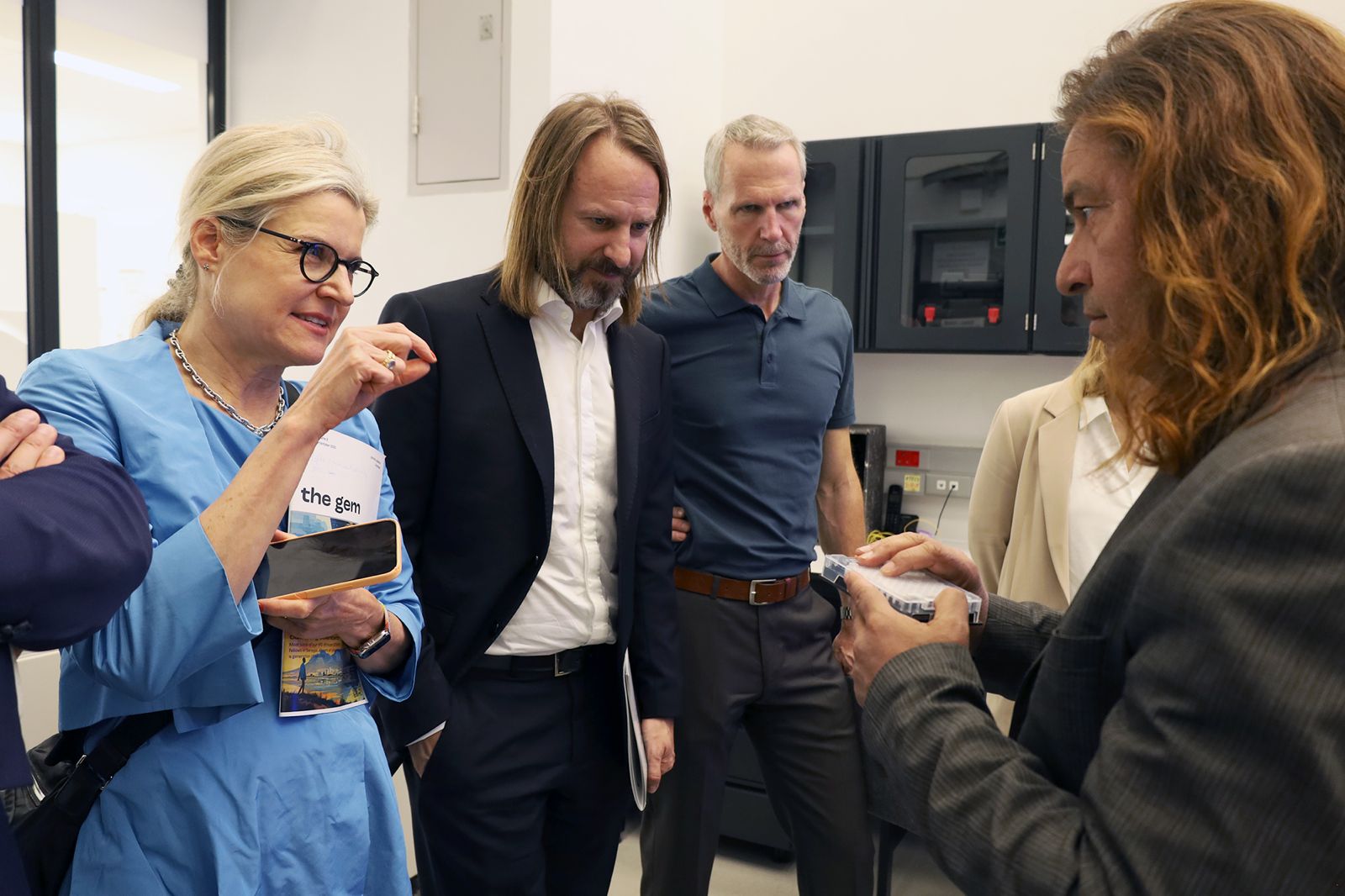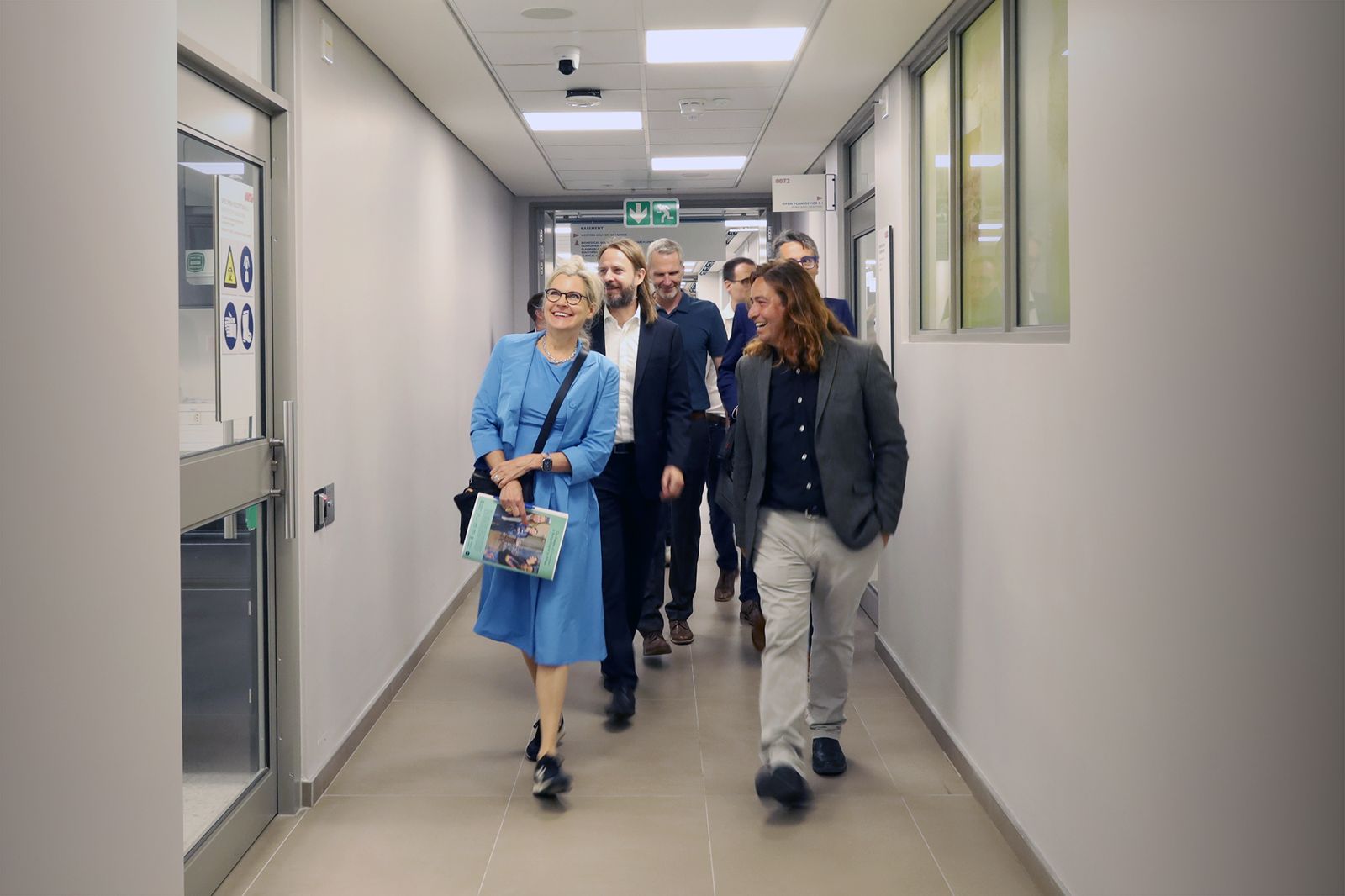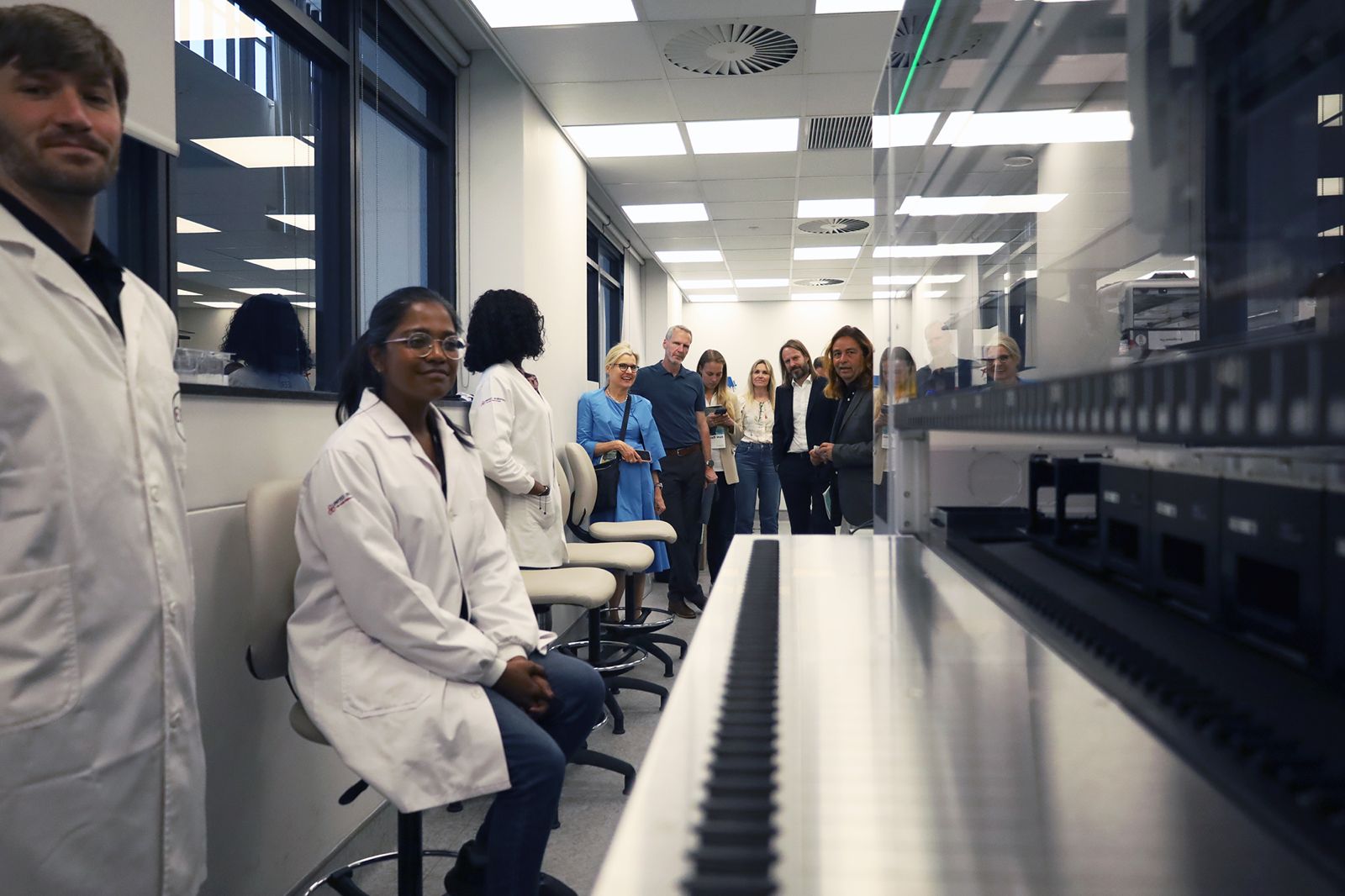Bavarian Delegation Explores CERIÂ’s Genomic Innovation Hub
As part of their visit to the Stellenbosch University and the Centre for Epidemic Response and Innovation (CERI), the universities in the Bavarian delegation toured CERIÂ’s state-of-the-art facilities at the Tygerberg Campus on Tuesday, 4 November. Accompanied by Prof Tulio de Oliveira and senior researchers, the group explored how CERI is driving innovation in genomic surveillance and building scientific partnerships across Africa.
The visit took place under the framework of MondayÂ’s signing of a Memorandum of Understanding (MOU) between stakeholders in research and innovation from the Free State of Bavaria in Germany and the Western Cape Province of South Africa.
This new partnership aims to deepen cooperation in biotechnology through joint research, mobility programmes, and knowledge exchange – strengthening innovation ecosystems in both regions. Coordinated by the Bavarian Research Alliance (BayFOR) via its Scientific Coordination Office Bavaria-Africa (WKS Bavaria-Africa), the agreement reflects a shared vision to promote biotechnology development through collaboration built on equality, reciprocity, and mutual benefit.
Inside CERIÂ’s Cutting-Edge Infrastructure
The tour began in one of CERI’s most remarkable spaces, where the “big freezer” – the Biorepository Unit – is stored. It’s one of only 25 in the world, and one of just two in the Southern Hemisphere (the other being in Australia).
Rusbeshan Nayager, Unit Manager at the BMRI Biorepository, informed the delegates: “Our long-term storage system for samples is very sophisticated. If you want to take a sample out, you just provide it with a barcode. The system will then pick the tube(s) you require, and the robotic arm takes it out.”
The machine is designed with multiple redundancies. “If the grid is interrupted, we go on to the university generator. If that collapses, we have multiple liquid nitrogen tanks to keep the samples cool, and the system also has UPS back-up. So it’s guaranteed to keep samples at -80 degrees at all times,” said Nayager.
Prof de Oliveira added that adopting this system required a shift in mindset among CERI’s researchers. “For two years my own team tried at least 20 times to sneak a small -80 freezer into the lab, in all kinds of creative ways,” he said. “But now the biorepository unit is everyone’s best friend.”
The delegation moved on to visit the CERI laboratory, which is run by a small, highly skilled and professional team of senior researchers – rather than students.
CERI has already hosted over 800 fellows from 50 African countries, training them in advanced genomic surveillance of pathogens. “If they see an outbreak in their country, we will ship them reagents with a 48-hour turnaround time,” noted Prof de Oliveira. “We’ve begun to build a very efficient system so that they do not always have to send samples to us – instead, we can send reagents to them.”
Delegates also caught a glimpse of BMRI’s big neighbour – the Tygerberg Hospital. The second-largest in South Africa, the hospital’s corridors stretch for 40 kilometres. “This is a fantastic hospital to not only access infectious disease samples – but also for academic training,” explained Prof de Oliveria. “We have medical specialists at CERI and a tunnel that connects directly to the hospital, so they can move between easily. We have multiple programmes there, such as the neonatal ICU. If deaths occur without a non-infectious disease, we can access samples to investigate if there is a new pathogen.”
Shared Vision for Scientific Exchange
Prof Dr Juliane Winkelmann, Senior Vice President for International Alliances and Alumni at the Technical University of Munich, expressed her admiration for CERI’s facilities and the vision for the new partnership. “I think this collaboration can create advancements in science,” she said. “Something I have in mind could be a staff exchange – inspiring for both staff and young talent, which is important.” Prof de Oliveira added that CERI will visit Bavaria in February or March next year to continue advancing these discussions.
Prof Dr Winkelmann continued saying that beyond infectious diseases, she also has ideas about investigating and advancing research on rare diseases, disorders, and sequencing technologies. “Everything is built up to be able to be scaled in the future. It has to be scalable. You have to centralise the facilities. I think what we have learnt today is that researchers don’t need their own fridges anymore – everything is stored centrally. It is a very important step,” she said.
Prof Dr Andreas Ladurner echoed her sentiments. “I am impressed by how CERI is addressing important medical issues and infections in South Africa,” he said. “It is wonderful to see the training you do, and the planning gone into making sure the facilities and resources are up to standard for this level of clinical and methodological research.”
Organic chemist, Dr Dino Berthhold, noted that much of the foundation of CERI’s research lies in organic chemistry. “It would be great if future collaboration could put an emphasis on this,” he said. “To be included in this environment would be fantastic, and there are such great opportunities to get funding.” He added that the facilities were “mind-blowing, even for German standards. I am really happy that South Africa is willing to invest. It’s more than a bet on the future, it’s a promise.”
Dr Philipp Baaske shared similar enthusiasm. “I have heard so many nice things about South Africa, Stellenbosch, and Cape Town from one of my friends, and I have really been looking forward to coming here. So far, the experience has been even beyond my expectations,” he said. “This could easily be in California, or Bavaria, or Cambridge – it is amazing, and it is cutting edge. I also love the people, culture, and atmosphere. I would love to see a humanised relationship build up over the years. We have knowledge, and we have people. This can become a hotspot for Africa.”
Building the Future Together
The Bavarian delegation’s visit to CERI not only showcased world-class facilities and groundbreaking genomic work but also gave life to this new partnership’s vision – a bridge between Bavaria and the Western Cape for innovation, exchange, and shared learning. From biotechnology and rare disease research to cross-border fellowships and staff exchanges, both regions are laying the groundwork for a future where science connects people and drives progress on a truly global scale.



News date: 2025-11-12
Links:
KRISP has been created by the coordinated effort of the University of KwaZulu-Natal (UKZN), the Technology Innovation Agency (TIA) and the South African Medical Research Countil (SAMRC).
Location: K-RITH Tower Building
Nelson R Mandela School of Medicine, UKZN
719 Umbilo Road, Durban, South Africa.
Director: Prof. Tulio de Oliveira




